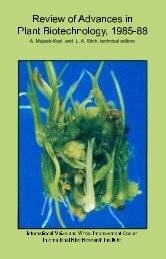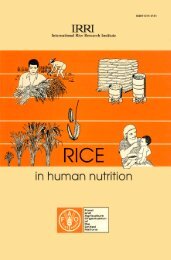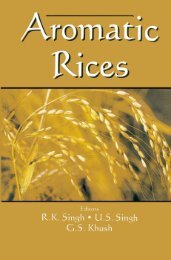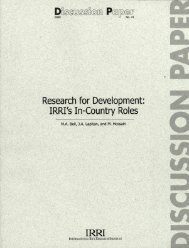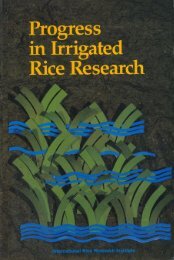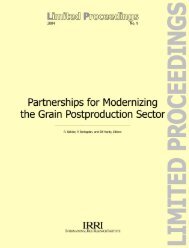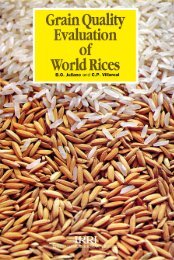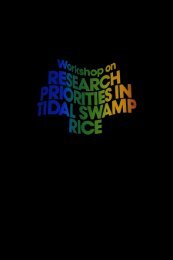Rainfed rice - IRRI books - International Rice Research Institute
Rainfed rice - IRRI books - International Rice Research Institute
Rainfed rice - IRRI books - International Rice Research Institute
You also want an ePaper? Increase the reach of your titles
YUMPU automatically turns print PDFs into web optimized ePapers that Google loves.
RAINFED RICE A SOURCEBOOK OF BEST PRACTICES AND STRATEGIES IN EASTERN INDIA<br />
Impact assessment<br />
Effect of FPB on changes in biodiversity.<br />
Assessment of adoption pattern (rate, diffusion, costs/benefits).<br />
Project status and results<br />
The project has run for two cropping seasons. The preliminary results show<br />
that:<br />
There was, by and large, a good agreement among farmers and breeders<br />
in choice of varieties.<br />
The agreement was, however, less in more diverse environments.<br />
Though farmers and breeders agreed in on-farm varietal ranking, their<br />
on-station ranking did not match.<br />
The yield ranking did not match with the overall ranking of varieties by<br />
breeders and more so by farmers. This shows that the rankers, especially<br />
the farmers, considered other traits equally or more important than yield<br />
alone in selection.<br />
Farmers’ preferences of varieties differed greatly in raw and parboiled <strong>rice</strong>.<br />
The results show that all the test varieties are not suitable for either raw or<br />
parboiled <strong>rice</strong>. The preference of the farmers based on cooking characters<br />
was not correlated with the actual yield of the varieties.<br />
Conclusions<br />
On-station research alone will not fully serve farmers in uncertain<br />
rainfed heterogeneous environments. However, some doubt whether<br />
farmers’ participatory approaches, e.g., participatory breeding, are the<br />
best alternatives.<br />
The <strong>IRRI</strong>-Eastern India FPB project aims more at testing some of the<br />
hypotheses testing whether FPB increased efficiency, rather than<br />
pursuing it as an alternative to formal breeding. The results will<br />
determine the future of FPB.<br />
FPB can complement mainstream plant breeding.<br />
FPB can fulfill equity, efficiency and sustainability objectives.<br />
Methodology development efforts are needed to make FPB more effective.<br />
FPB will become legitimate only if research policy and institutional<br />
support are forthcoming.<br />
Prepared by:<br />
R. K. Singh, K. Prasad, R.K. Sahu, J.K. Roy, A.T. Roy, S. Singh,<br />
R. Thakur and N.K. Sarma<br />
130




